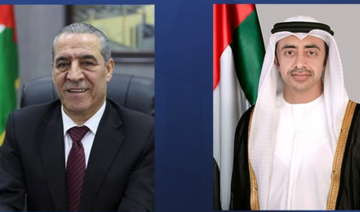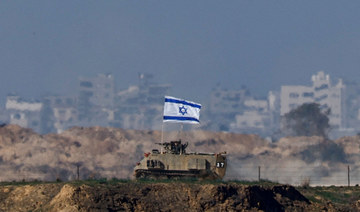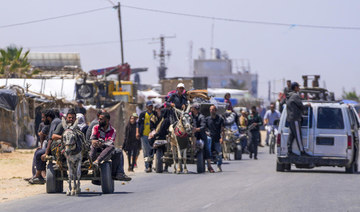JERUSALEM: The Israeli military campaign in Gaza, experts say, now sits among the deadliest and most destructive in recent history.
In just over two months, the offensive has wreaked more destruction than the razing of Syria’s Aleppo between 2012 and 2016, Ukraine’s Mariupol or, proportionally, the Allied bombing of Germany in World War II.
It has killed more civilians than the US-led coalition did in its three-year campaign against the Daesh group.
The Israeli military has said little about what kinds of bombs and artillery it is using in Gaza. But from blast fragments found on-site and analyzes of strike footage, experts are confident that the vast majority of bombs dropped on the besieged enclave are US-made. They say the weapons include 2,000-pound (900-kilogram) “bunker-busters” that have killed hundreds in densely populated areas.
With the Palestinian death toll in Gaza surpassing 20,000, the international community is calling for a ceasefire. Israel vows to press ahead, saying it wants to destroy Hamas’ military capabilities following the militant group’s Oct. 7 cross-border rampage that triggered the war, in which it killed 1,200 people and took 240 others hostage.
The Biden administration has quietly continued to supply arms to Israel. Last week, however, President Joe Biden publicly acknowledged that Israel was losing international legitimacy for what he called its “indiscriminate bombing.”
Here’s a look at what is known so far about Israel’s campaign on Gaza.
HOW MUCH DESTRUCTION IS THERE IN GAZA?
Israel’s offensive has destroyed over two-thirds of all structures in northern Gaza and a quarter of buildings in the southern area of Khan Younis, according to an analysis of Copernicus Sentinel-1 satellite data by Corey Scher of the CUNY Graduate Center and Jamon Van Den Hoek of Oregon State University, experts in mapping damage during wartime.
The percentage of damaged buildings in the Khan Younis area nearly doubled in just the first two weeks of Israel’s southern offensive, they said.
That includes tens of thousands of homes as well as schools, hospitals, mosques and stores. UN monitors have said that about 70 percent of school buildings across Gaza have been damaged. At least 56 damaged schools served as shelters for displaced civilians. Israeli strikes damaged 110 mosques and three churches, the monitors said.
Israel holds Hamas responsible for civilian deaths by embedding militants in civilian infrastructure. Those sites also shelter multitudes of Palestinians who have fled under Israeli evacuation orders.
“Gaza is now a different color from space. It’s a different texture,” said Scher, who has worked with Van Den Hoek to map destruction across several war zones, from Aleppo to Mariupol.
HOW DOES THE DESTRUCTION STACK UP HISTORICALLY?
By some measures, destruction in Gaza has outpaced Allied bombings of Germany during World War II.
Between 1942 and 1945, the allies attacked 51 major German cities and towns, destroying about 40-50 percent of their urban areas, said Robert Pape, a US military historian. Pape said this amounted to 10 percent of buildings across Germany, compared to over 33 percent across Gaza, a densely populated territory of just 140 square miles (360 square kilometers).
“Gaza is one of the most intense civilian punishment campaigns in history,” said Pape. “It now sits comfortably in the top quartile of the most devastating bombing campaigns ever.”
The US-led coalition’s 2017 assault to expel the Daesh group from the Iraqi city of Mosul was considered one of the most intense attacks on a city in generations. That nine-month battle killed around 10,000 civilians, a third of them from coalition bombardment, according an Associated Press investigation at the time.
During the 2014-2017 campaign to defeat Daesh in Iraq, the coalition carried out nearly 15,000 strikes across the country, according to Airwars, a London-based independent group that tracks recent conflicts. By comparison, the Israeli military said last week it has conducted 22,000 strikes in Gaza.
WHAT TYPES OF BOMBS ARE BEING USED?
The Israeli military has not specified what it is using. It says every strike is cleared by legal advisers to make sure it complies with international law.
“We choose the right munition for each target — so it doesn’t cause unnecessary damage,” said the army’s chief spokesman, Rear Adm. Daniel Hagari.
Weapons experts have been able to draw conclusions by analyzing blast fragments found on-site, satellite images and videos circulated on social media. They say the findings offer only a peek into the full scope of the air war.
So far, fragments of American-made Joint Direct Attack Munitions (JDAM) bombs and smaller diameter bombs have been found in Gaza, according to Brian Castner, a weapons investigator with Amnesty International.
The JDAM bombs include precision-guided 1,000- and 2,000-pound (450-kilogram and 900-kilogram) “bunker-busters.”
“It turns earth to liquid,” said Marc Garlasco, a former Pentagon defense official and a war crimes investigator for the UN “It pancakes entire buildings.”
He said the explosion of a 2,000-pound bomb in the open means “instant death” for anyone within about 30 meters (100 feet). Lethal fragmentation can extend for up to 365 meters (1,200 feet).
In an Oct. 31 strike on the urban refugee camp of Jabaliya, experts say a 2,000-pound bomb killed over 100 civilians.
Experts have also identified fragments of SPICE (Smart, Precize Impact, Cost-Effective) 2000-pound bombs, which are fitted with a GPS guidance system to make targeting more precise. Castner said the bombs are produced by the Israeli defense giant Rafael, but a recent State Department release first obtained by The New York Times showed some of the technology had been produced in the United States.
The Israeli military is also dropping unguided “dumb” bombs. Several experts pointed to two photos posted to social media by the Israeli Air Force at the start of the war showing fighter jets stocked with unguided bombs.
IS THE STRATEGY WORKING?
Israel says it has two goals: destroy Hamas and rescue the 129 hostages still held by militants.
Eleven weeks into the war, Israel says it has destroyed many Hamas sites and hundreds of tunnel shafts and has killed 7,000 Hamas fighters out of an estimated 30,000-40,000. Israeli leaders say intense military pressure is the only way to free more hostages.
But some families of hostages worry that the bombing endangers their loved ones. Hostages released during a weeklong ceasefire last month recounted that their captors moved them from place to place to avoid Israeli bombardment. Hamas has claimed that several hostages died from Israeli bombs, though the claims could not be verified.
The level of destruction is so high because “Hamas is very entrenched within the civilian population,” said Efraim Inbar, head of the Jerusalem Institute for Strategy and Security, a think tank. He also said intense bombardment of Hamas’ tunnels is needed to protect advancing Israeli ground forces from attacks.
Israel’s military campaign in Gaza seen as among the most destructive in recent history, experts say
https://arab.news/c373n
Israel’s military campaign in Gaza seen as among the most destructive in recent history, experts say

- With the Palestinian death toll in Gaza surpassing 20,000, the international community is calling for a ceasefire
- The Biden administration has quietly continued to supply arms to Israel
Donors pledge over $2 billion for Gaza at Kuwait conference

- The conference said the funds would be dispersed over two years, with the possibility of an extension
- The initiative is designed “to mobilize efforts to support life-saving humanitarian interventions in the Gaza Strip”
KUWAIT CITY: A conference of international donors in Kuwait pledged over $2 billion in aid to Gaza Sunday as UN Secretary-General Antonio Guterres called for an “immediate” ceasefire in the Israel-Hamas war.
The conference, organized by the International Islamic Charitable Organization (IICO) and UN humanitarian coordination agency OCHA, said the funds would be dispersed over two years, with the possibility of an extension.
The initiative is designed “to mobilize efforts to support life-saving humanitarian interventions in the Gaza Strip, and to support the prospects for early recovery for the population,” IICO general manager Bader Saud Al-Sumait said.
It would be applied on five different tracks — “life-saving interventions, shelter, health, education, and economic empowerment,” Sumait said as he read the conference’s final statement.
Guterres urged an immediate halt to the war, the return of hostages held in Gaza and a “surge” in humanitarian aid to the besieged Palestinian territory.
“I repeat my call, the world’s call for an immediate humanitarian ceasefire, the unconditional release of all hostages and an immediate surge in humanitarian aid,” Guterres said in a video address.
“But a ceasefire will only be the start. It will be a long road back from the devastation and trauma of this war,” he added.
Israeli strikes on Gaza continued on Sunday after it expanded an evacuation order for Rafah despite an international outcry over its military incursion into eastern areas of the city, effectively shutting a key aid crossing.
“The war in Gaza is causing horrific human suffering, devastating lives, tearing families apart and rendering huge numbers of people homeless, hungry and traumatized,” Guterres said.
Meeting Kuwait’s Emir Sheikh Meshal Al-Ahmed Al-Sabah, the UN chief accepted an honorary shield “on behalf of the United Nations, and especially on behalf of the almost 200 members of the UN that were killed in Gaza.”
On Friday in Nairobi, Guterres warned that Gaza faced an “epic humanitarian disaster” if Israel launched a full-scale ground operation in Rafah.
Gaza’s bloodiest-ever war began following Hamas’s unprecedented October 7 attack on Israel that resulted in the deaths of more than 1,170 people, mostly civilians, according to an AFP tally of Israeli official figures.
Vowing to destroy Hamas, Israel launched a retaliatory offensive that has killed more than 35,034 people in Gaza, mostly women and children, according to the Hamas-run territory’s health ministry.
Egypt says to support South Africa ICJ case against Israel

- In its most recent appeal to the ICJ on Friday, South Africa again accused Israel of “continuing violations of the Genocide Convention”
- Egypt on Sunday said its move to back the case comes “in light of the worsening severity and scope of Israeli attacks against Palestinian civilians in the Gaza Strip”
CAIRO: Egypt on Sunday announced its intention to formally support South Africa’s case at the International Court of Justice against Israel, alleging genocide in its war against Hamas in Gaza.
Pretoria brought its case to the ICJ in December, calling on the UN court to order Israel to suspend its military operations in Gaza.
In its most recent appeal to the ICJ on Friday, South Africa again accused Israel of “continuing violations of the Genocide Convention” and of being “contemptuous” of international law.
Egypt on Sunday said its move to back the case comes “in light of the worsening severity and scope of Israeli attacks against Palestinian civilians in the Gaza Strip,” according to a foreign ministry statement.
It further pointed to Israel’s systematic “targeting of civilians and destruction of infrastructure” and “pushing Palestinians into displacement and expulsion.”
South Africa has called on the world’s top court to order Israel to “immediately withdraw and cease its military offensive” in Rafah, the southernmost Gaza city where about 1.5 million Palestinians had been pushed against the Egyptian border.
Israel on Monday sent ground troops and tanks into eastern Rafah, later seizing and shutting the Palestinian side of the Rafah crossing with Egypt.
UN Secretary-General Antonio Guterres said on Friday that Gaza risked an “epic humanitarian disaster” if Israel launched a full-scale ground operation in Rafah.
Egypt was the first Arab country to sign a peace treaty with Israel in 1979, and has acted as a key mediator between Israeli and Palestinian negotiators, including in the current war.
It also shares the only border with the Gaza Strip not controlled by Israel, but has refused to coordinate aid access through the Rafah crossing since Israeli forces seized it.
State-linked television channel Al-Qahera News on Sunday reported a high-level source denying Israeli media reports of “coordination between Israel and Egypt at the Rafah crossing.”
Egypt has also issued repeated warnings against escalation since negotiators from both Israel and Hamas departed Cairo on Thursday after talks again failed to achieve a truce.
In January the ICJ called on Israel to prevent acts of genocide following the original South African request for international action.
The court rejected a second South African application for emergency measures over Israel’s threat to attack Rafah. South Africa made a new request in early March.
Qatari emir meets US congress members

- Two sides discussed ways to strengthen relations between Qatar and the US
DOHA: Qatar’s Emir Sheikh Tamim bin Hamad Al-Thani met a delegation of US Congress members on Sunday during their visit to Doha.
The visitors were Democrats Salud Carbajal, Ami Bera and Juan Vargas (California) and Derek Kilmer (Washington) and Republicans Dave Joyce (Ohio) and Lance Gooden (Texas), the Qatar News Agency reported.
The two sides discussed ways to strengthen relations between Qatar and the US, strategic cooperation in various sectors, and regional and global developments.
The talks came a day after Qatar’s Prime Minister and Minister of Foreign Affairs Sheikh Mohammed bin Abdulrahman bin Jassim Al-Thani spoke to UN Secretary-General Antonio Guterres about the situation in Gaza.
During a phone call, they discussed joint mediation efforts to end the war, the release of prisoners and detainees, and getting humanitarian aid to all areas of the enclave.
Qatar has played an intermediary role throughout the war in Gaza. Along with the US and Egypt, it was instrumental in helping negotiate the brief halt to the fighting in November that led to the release of dozens of hostages.
Israel lacks ‘credible plan’ to safeguard Rafah civilians, says Blinken

- Blinken said Biden determined to help Israel defend itself and shipment of 3,500 2,000-pound and 500-pound bombs was only US weapons package being withheld
WASHINGTON: US Secretary of State Antony Blinken on Sunday defended a decision to pause a delivery to Israel of 3,500 bombs over concerns they could be used in the Gazan city of Rafah, saying Israel lacked a “credible plan” to protect some 1.4 million civilians sheltering there.
Speaking to ABC News’ This Week, Blinken said that President Joe Biden remains determined to help Israel defend itself and that the shipment of 3,500 2,000-pound and 500-pound bombs was the only US weapons package being withheld.
That could change, he said, if Israel launches a full-scale attack on Rafah, which Israel says it plans to invade to root out fighters of the ruling Hamas militant group.
Biden has made clear to Israel that if it “launches this major military operation to Rafah, then there are certain systems that we’re not going to be supporting and supplying for that operation,” said Blinken.
“We have real concerns about the way they’re used,” he continued. Israel needs to “have a clear, credible plan to protect civilians, which we haven’t seen.”
Rafah is hosting some 1.4 million Palestinians, most of them displaced from elsewhere in Gaza by fighting and Israeli bombardments, amid dire shortages of food and water.
The death toll in Israel’s military operation in Gaza has now passed at least 35,000 Palestinians, according to Gaza’s Hamas-run health ministry.
The war was triggered by the Hamas-led attack on southern Israel on Oct. 7 in which some 1,200 people were killed and more than 250 people taken hostage, according to Israeli tallies.
Israel says 620 soldiers have been killed in the fighting.





















